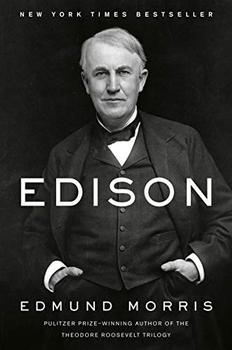Summary | Excerpt | Reviews | Beyond the Book | Readalikes | Genres & Themes | Author Bio

Having thus anticipated by more than a century both swarm intelligence and DNA inheritance theory, Edison gave up trying to understand relativity and returned to the more tangible universe he preferred.
A Big Bump for Cookies
As he saw it, his first order of business in the new decade was to reimpose his own—highly individual—personality upon Thomas A. Edison, Inc., the sprawling industrial conglomerate that he had been forced to neglect during the war. He chose not to notice that it had thereby done much better than it had in earlier years, when he had run its manifold activities—phonograph and record production, movie making, cement milling, storage battery development, and laboratory research—with such autocratic willfulness as to make his executives despair of ever influencing him.
Edison was not an easy man to advise, being a combination of twinkling charm and bruising imperiousness. In his youth the charm had prevailed, but now that he was a septuagenarian and almost unreachably deaf, the urge to overbear had become a compulsion, and he had lost much of the bonhomie that had kept thousands of men working for him, and worshiping him, over the past half-century. Long gone was the perpetual hint of a smile flickering around the corners of his mouth, as if he were about to break into thigh-slapping laughter. The artist Richard Outcault remembered its radiance back in '89, when "the boys" presented "the Old Man" with a gold and silver phonograph for his birthday. "Edison's smile! [It] sweetened up the atmosphere of the whole building... . As long as I live the sweet spirit that pervaded the atmosphere of the laboratory will always remain with me."
Edison still moved with the jerky energy that kept him awake, and acting more decisively, than young men unable to match his eighteen-hour-a-day schedule. He regarded exercise as a waste of time, and sleep even more so. Since he was twenty, he had maintained his 175-pound, five-foot-nine-and-a-half-inch frame with only a few lapses, quickly corrected. ("I do believe I have a big bump for cookies.") The most remarkable thing about his appearance, apart from the brilliance of the blue-gray eyes, was the largeness of his head, amplified by its thick mop of snowy hair. He wore custom-made size eight-and-a-half straw hats, and slashed the bands of his caps for comfort. His handshake was perfunctory and surprisingly cold. Monomaniacally focused on whatever current project interested him, he strode at a forward angle, hands in vest pockets, aware only of his destination and completely unconscious of time. He never wore a watch, and made no distinction between day and night, nodding off when he felt like it and expecting his assistants to follow suit. The same went for waking up. If two hours of rest was enough for him, he did not see why anyone else should want more.
Lovable as he was—or had been in the past—Edison did not return affection, beyond the occasional beaming familiarity, in which there was often a note of tease. He thought hurtful practical jokes—electrified washbasins, a wad of chewing tobacco spat onto a white summer suit, firecrackers tossed at the bare feet of children—were funny. Having made money easily all his life, thanks to phenomenal energy and the mysterious gift of imagination (his personal wealth, at latest calculation, was almost $10 million), he was unmoved by the lesser luck or ill fortune of others, and casual about the loneliness of his wives. Now, returning to his laboratory desk in 1920, he was determined to teach Charles Edison a thing or two about running a large corporation.
Excerpted from Edison by Edmund Morris. Copyright © 2019 by Edmund Morris. All rights reserved. No part of this excerpt may be reproduced or reprinted without permission in writing from the publisher.
Your guide toexceptional books
BookBrowse seeks out and recommends the best in contemporary fiction and nonfiction—books that not only engage and entertain but also deepen our understanding of ourselves and the world around us.